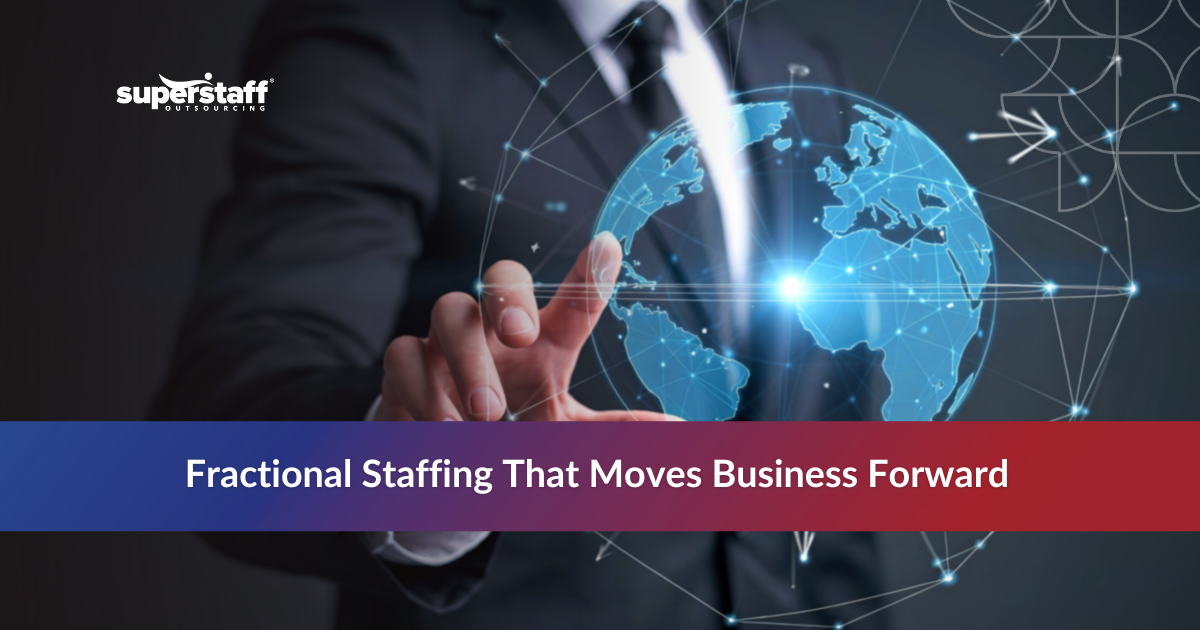
As a Chief Human Resources Officer (CHRO), you probably see firsthand how many organizations struggle with the demands and complexities of this process. Following “The Great Resignation” in the U.S. and widespread labor shortages worldwide, many of your fellow recruitment leaders may struggle to attract and retain top talent.
Sadly, today’s employees are also becoming increasingly disengaged, leading to trends like “quiet quitting” and “bare minimum Mondays.”
To enhance employee engagement, satisfaction, and retention in these challenging times, consider outsourcing recruitment functions to a reliable BPO provider. Working with outsourced recruitment specialists can boost your employee experience by streamlining processes, giving you access to specialized expertise, and allowing you to focus on strategic initiatives.
This article will explore the role of recruitment process outsourcing in helping you keep top employees and improve worker satisfaction. We’ll also guide you through the best practices for successfully implementing your RPO strategy.
The Importance of Recruitment in Shaping Employee Experiences

First impressions matter when building connections – and the employer-employee relationship is no exception.
The recruitment stage is a critical touchpoint that sets the tone for the entire employee experience. According to a 2024 Candidate Experience Report, 76% of workers say that positive experiences during the hiring process influence their decision to work for a company. Meanwhile, 52% declined job offers from potential employers because of negative recruitment experiences.
That’s not all. Workers who feel treated poorly during the hiring process are also likely to tell their peers about their experience, with 35% writing a lousy business review on social media. Since 86% of job seekers read online reviews before applying to a company, employers may experience a snowball effect where one failed hire becomes a shortage of qualified applicants.
So, what’s the best way to make a positive first impression on your potential employees? We recommend investing in and optimizing your hiring processes by outsourcing recruitment functions.
What Is Recruitment Process Outsourcing and Its Role in Employee Experience?
Recruitment process outsourcing (RPO) is a strategy in which companies employ a third-party provider to handle part or all of their hiring processes. Leveraging data-driven strategies, RPO providers take a holistic approach to workforce building, optimizing your systems from end to end to create a more streamlined and strategic candidate experience.
The central role of RPO in boosting employee experience is helping your company develop and execute a more effective recruitment strategy. This creates a better hiring experience for potential candidates and reduces the chances of mis-hires, leading to lower attrition and improved team dynamics.
Effective Recruitment = Better Employee Retention
Did you know that almost 46% of newly hired workers are considered mis-hires? Making the wrong choices during recruitment negatively affects employee retention, lowering performance and morale and impacting company culture.
By outsourcing recruitment, you can attract the right candidates as early as the first job posting and narrow your selection to only those who truly fit the bill. Your RPO partner can help you strengthen your employer brand by creating more positive experiences for every applicant and improving employee retention by reducing the risk of mis-hires.
The Powerful Advantages of Outsourcing Recruitment Functions

Having discussed the importance of recruitment in shaping employee experiences, let’s talk about how outsourcing can help. Understanding the strategic advantages of RPO can help you evaluate whether this approach is the right fit for your business. Here are just a few of its benefits:
Access to Specialized Recruitment Expertise and Technology
Does your hiring team spend countless hours sifting through mountains of resumes, searching for candidates with the right skills and experience for a role? Working with outsourced specialists can lighten your workload and teach your team the best practices in recruitment.
RPO firms often use state-of-the-art recruitment technologies to help you narrow down a large pool of potential applicants, selecting only the most qualified candidates. They also go beyond traditional hiring practices and opt for innovative approaches like skills-based hiring to strengthen your competitive edge in the tight labor market.
Improved Efficiency and Reduced Time-to-Hire
Recent studies have found that the average time to fill open roles has increased to 47.5 days, meaning companies like yours have to wait more than a month to find, hire, and secure qualified employees. During that period, your company may leave a crucial position unfilled, leading to productivity losses and operational disruptions.
The good news is that outsourcing recruitment can reduce time-to-hire by up to two weeks. With the right RPO provider, you can speed up your hiring process and improve overall productivity and efficiency.
Enhanced Candidate Experience Through Professional Handling
In previous sections, we’ve highlighted how job seekers’ experiences during the hiring process set the tone for their future experiences as employees in your company. However, we have not discussed precisely how recruitment process outsourcing contributes to a better candidate experience.
Imagine this scenario: Your in-house human resources team is swamped with workload. They’re already taking on crucial talent management tasks, including handling payroll, maintaining and updating employee records, maximizing worker benefits, managing team conflicts and resolutions, conducting disciplinary actions, and more.
In addition, they’re tasked with filling multiple open roles in your organization. Since they’re already overextended with managing existing employees, they may cut corners when communicating with potential ones. The result is that you may inadvertently burn bridges with candidates who may have otherwise been a good fit for your company.
RPO: A Win-Win Solution for Your In-House Team and Potential Employees
The 2024 Candidate Experience Report mentioned above found that more than half (53%) of all job seekers have experienced being “ghosted” by a recruiter. Of candidates who have been ghosted, 31% lost communication before their first interview, 25% never heard back after sending their application, 16% were ignored after their interview, and 15% were pushed aside after receiving a verbal job offer.
Being ghosted by a potential employer can frustrate and confuse many job seekers, leading to a poor candidate experience overall. Thankfully, working with RPO firms can help you address this issue head-on.
Instead of letting your in-house HR team get overwhelmed with mountains of workload, supporting your operations by outsourcing recruitment can be a more effective strategy. RPO specialists will focus on optimizing your hiring process, which includes handling all job applications efficiently and professionally.
They will not only lighten your core team’s workload; they will also ensure that all candidates are communicated with about the status of their application, provide transparency about the process when needed, and ensure that no one is left in the dark about where they stand.
Cost Savings and Resource Optimization
Whether you’re running a startup or an established enterprise, you know that recruitment can be a costly process. All the expenses associated with hiring, such as application reviews, background screening, training, onboarding, wages, and compensation packages, can stretch your budget to its limit if you don’t have the right strategy in place.
If you make a poor hiring decision, the costs can add up even more. For example, the Sales Benchmark Index estimates that companies that mis-hire sales representatives earning at least $100,000 can lose over $1 million in revenue. Then, when that worker leaves the organization, it’ll cost more to start the recruitment process all over again.
By outsourcing recruitment functions to a reliable provider, you can gain significant savings by tapping into a broader global talent pool and leveraging lower labor and living costs in offshore nations. Since RPO firms help you avoid mis-hires, you also save resources in the long run, allowing you to focus on more pressing aspects of your business.
Best Practices for Implementing Recruitment Process Outsourcing
Now that you know the advantages of outsourcing recruitment, your next step is to follow the best practices for implementing RPO. Careful planning and execution are essential to forming a successful partnership with your provider.
Following these practical tips can ensure a smooth transition when launching your offshore or nearshore operations, enabling you to maximize the benefits of your outsourcing arrangement. Here are the practical steps you can take when offloading recruitment functions to a third-party provider:
Identifying and Selecting the Right Recruitment Partner
The first step in maximizing your outsourcing arrangement is finding and selecting the right RPO partner. Like traditional recruitment, not choosing the most suitable candidate can backfire spectacularly on your organization.
So, perform your due diligence and research all vendor options before making your final choice. Here are some key considerations you should take into account when choosing between different providers:
- Access to Wide Talent Pool: Can your chosen RPO vendor help you tap into a massive labor market full of professionals with specialized expertise?
- End-to-End Capabilities: Does your RPO provider support and strengthen all aspects of your recruitment process?
- Customizable and Scalable Solutions: Can they upgrade or downgrade recruitment operations depending on your company’s specific needs and goals?
- Technology and Innovation: Do they have access to the latest recruitment technologies? Are they committed to adopting innovative hiring practices to get you the best possible results?
- Industry Expertise: Does your RPO vendor have experience handling recruitment for others in your industry?
Defining Clear Objectives and Expectations
Once you’ve selected a recruitment process outsourcing partner that meets your needs, your next move should be to ensure both parties understand and agree on the scope of your arrangement. Here are the key considerations you should discuss with your RPO vendor so you can ensure a win-win relationship:
- Service Level Agreements (SLA): Negotiate and document all terms and conditions relevant to your outsourcing partnership, including roles and responsibilities, expectations, objectives, and termination clauses.
- Key Performance Indicators (KPI): Set KPIs and metrics at the start of your partnership so you can objectively measure whether your outsourced team is performing according to your expectations.
- Pricing and Payment Terms: Ask for a transparent breakdown of costs and agree on a fixed pricing structure.
- Data Privacy and Security: Discuss your outsourcing vendor’s cybersecurity and data protection policies and ensure they comply with ISO standards.
- Regulatory Compliance: Make sure your RPO provider complies with labor laws and regulations in your country and internationally.
Ensuring Seamless Integration With Internal HR Processes
After clearly defining your expectations and goals, launching your outsourced recruitment operations is the next step. To ensure a seamless integration with your internal processes, communicate thoroughly with your in-house and offshore teams. Although it’s ideal for both teams to have regular contact to maintain alignment throughout the entire recruitment process, here are the specific areas where they need to be perfectly in synch:
- Onboarding Processes: Onboarding is when your team introduces candidates to your company’s processes, policies, and work culture. Ensuring alignment between what your outsourced recruiters say to new employees and how your in-house HR team handles the transition is crucial to setting the right expectations and avoiding conflict and misunderstandings during the new hire’s employment.
- Training and Upskilling: Most RPO vendors include employee training in their services. As such, you’ll need to ensure that the training new hires receive aligns with what is expected of them on the production floor. Your in-house and outsourced HR teams must agree on the necessary procedures and policies to set employees up for success in their daily work lives.
- Knowledge Transfer Policies: Recruitment is a dynamic process constantly evolving alongside an ever-changing labor market. Create a comprehensive knowledge transfer plan for your in-house and outsourced teams so they can exchange vital information and expertise, ensuring no one gets left behind on the latest trends and innovations.
Maintaining Effective Communication and Collaboration
Finally, maintaining constant communication and collaboration is the best way to ensure you and your recruitment process outsourcing vendor remain aligned throughout your partnership. Make sure to discuss these considerations before launching your outsourced operations:
- Communication Platforms: What platforms and channels (i.e., email, virtual conferencing apps, digital chatrooms, etc.) will you use to communicate with your RPO vendor?
- Reporting Frequency: How often do you expect to receive reports and updates on your outsourcing team’s progress and performance?
- Feedback Mechanisms: Are there ways for your outsourcing partner to reach you when they have urgent concerns that affect your recruitment operations?
Measuring the Impact of RPO on Employee Experience

The key to maximizing your outsourcing partnership is continually measuring and evaluating your RPO operations’ effectiveness. As such, you must work with a vendor that provides measurable and sustainable results.
Reviewing the impact of recruitment process outsourcing on your overall employee experience can help you improve your operations, achieve desired outcomes, and meet your workforce-building goals. Here are the metrics and methods you should know about:
Key Performance Indicators (KPIs) for Recruitment Effectiveness
In today’s competitive talent acquisition landscape, your outsourced recruitment team has to work efficiently and effectively to fill the gaps in your organization. To find out whether your offshore and nearshore specialists are performing according to your standards and expectations, you can set relevant KPIs, such as:
- Time-to-Hire: Measures how long it takes your RPO team to fill an open role, starting from when a candidate is contacted for an opening to when they accept your job offer
- Number of Qualified Candidates: Shows the ratio of qualified candidates who make it past the initial recruitment and screening stages
- Offer Acceptance Rate: Keeps track of the number of qualified candidates who accept your job offers compared to the number of offers extended overall
- Cost Per Hire: Takes into account all costs associated with filling a vacant position
- Quality of Hire: Determines whether endorsed candidates perform their duties according to your needs and expectations
Employee Feedback and Satisfaction Surveys
Beyond the above-mentioned recruitment KPIs, another way to assess the effectiveness of RPO in enhancing employee experience is by deploying feedback and satisfaction surveys. Here are the ways you can measure how happy your workers are with your company culture and processes:
- Employee Net Promoter Score (eNPS): Asks employees to rank how likely they are to tell others about your company’s hiring practices and recommend your workplace to others
- Employee Satisfaction Index (ESI): Measures how satisfied your workers are with their job and overall company culture
- Online Company Ratings: Includes websites like Glassdoor or Indeed where users can rate their experience working with an employer
- Employee Survey Results: Involves quantitative and qualitative measures that give existing employees a chance to provide you with direct feedback
Tracking Retention Rates and Employee Engagement Levels
While direct employee feedback can give you a good picture of what you’re doing right or wrong in your company culture, it can also be helpful to track retention rates and other employee engagement metrics.
Sometimes, actions speak louder than words. Workers may feel pressured to give a good rating in employee surveys but feel unengaged and disconnected from your organization. To address this problem, here are the metrics you should keep an eye on:
- Employee Turnover Rates: Measure the number of employees who have quit against the total number of workers at the beginning of a specific period. High turnover rates indicate that you need to take action and improve your working environment to keep your top performers.
- Absenteeism Rates: Evaluate how often a worker is absent compared to the total number of days worked. High absenteeism is a telltale sign of low engagement among employees.
-
- Productivity Rates: Determine how productive an employee is depending on their specific roles and responsibilities. Low productivity across the board is a massive warning sign that workers are dissatisfied, unmotivated, and disengaged from your company.
- Internal Promotion Rates: Measure the number of internal promotions in your organization across a specific period. High internal promotion rates signal that employees are willing to stay and grow their careers in your company instead of seeking development elsewhere.
Analyzing Recruitment Cost Savings and Return on Investment (ROI)
At its core, analyzing return on investment (ROI) for recruitment is relatively straightforward: calculate the “value” of a hire (what this worker brings to your company) and divide it by how much you invested in talent acquisition. To help you quantify the value of one hire, consider the following factors:
- Worker Performance: Has hiring this employee helped improve productivity in your operations?
- Revenue Impact: Do they directly or indirectly impact your revenue growth?
- Process Improvements: Have they helped improve your operational models and processes?
- Customer Satisfaction: Has their presence in your company boosted client acquisition and satisfaction?
Once you’ve determined the value of your hire, analyze your recruitment investments. Don’t forget to include salary and benefits, onboarding and training costs, and all expenses incurred during the hiring phase in your calculations.
Dividing value against investment can help you assess whether your strategy is working as intended and even determine areas where you can be more efficient regarding resource allocation. Regular assessment and analysis help you refine your strategy and ensure the ongoing success of your outsourced recruitment initiatives.
Connect With the Recruitment Process Outsourcing Specialists at SuperStaff
Outsourcing recruitment functions can significantly enhance employee experience by streamlining processes, providing expertise, and allowing HR leaders like you to focus on strategic priorities. If you want to position your organization for success amid today’s competitive labor market, get in touch with the RPO professionals at SuperStaff.
With our comprehensive and scalable recruitment process outsourcing solutions, you can create better experiences for potential employees, fortify your employer brand, and build a stronger and more connected workforce. Contact us for a quick consultation and learn more about what we can do for you!






